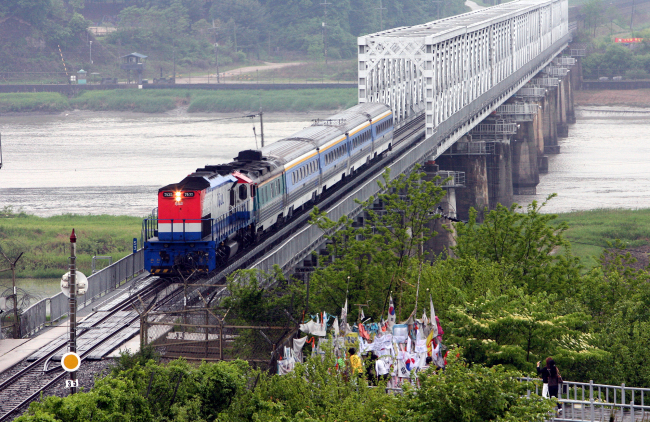[Newsmaker] Government to boost inter-Korean cooperation fund for 2019
By Jung Min-kyungPublished : Aug. 28, 2018 - 16:52
Next year’s allocation to the inter-Korean cooperation fund spiked 14.3 percent on-year to 1.1 trillion won ($994 million) in the government budget announced Tuesday, with the sharp increase reflecting Seoul’s hopes of expanding and making headway in cross-border projects. Unification-related budget stood at 1.3 trillion won.
The larger allocation aims to facilitate the implementation of the Panmunjom Declaration reached between the leaders of the two Koreas in April. The agreement states that the two sides will cooperate in promoting balanced economic growth and co-prosperity.

Of the 1.1 trillion won, 504 billion won will be earmarked specifically for joint projects, such as the modernization of the North’s railways and roads and reforestation of the communist nation’s decimated woodlands. This is a 46 percent increase from this year’s 344.6 billion won.
A Unification Ministry official, speaking under the customary condition of anonymity, told reporters that most of the budget for cross-border projects will go toward renovating railways and roads. Costs associated with design, construction and the purchase of equipment for modernization of railways and roads were taken into consideration in drawing up the budget.
Despite the increase in the budget allocation, however, doubts persist over whether the South will be able to follow-through with its goals for next year, with layers of sanctions against North Korea continuing to stand in the way, amid a perceived lack of progress in denuclearization negotiations between the US and North Korea.
“Projects that are linked to sanctions against North Korea will be pursued after certain conditions are met in sync with a progress in denuclearization talks,” the ministry official said.
In recent weeks, the South and North have been carrying out joint inspections and research on old roads and railways in the North, with the goal of building a network connecting the peninsula.
The project will also go some way toward helping Seoul realize its long-held vision of establishing a logistics network that connects with Europe via the Trans-Siberian Railway.
Seoul plans to eventually connect its Donghae Line on the east coast to Russia’s Trans-Siberian Railway through North Korea, linking it to Europe. Earlier this year, South Korean President Moon Jae-in agreed with Russian President Vladimir Putin to connect the Trans-Siberian Railway to the Trans-Korean Railway during his state visit to Moscow.
The operation of a joint liaison office in the border town of Kaesong in North Korea is to receive 8.3 billion won, but the project also faces obstacles, with US officials reportedly claiming that Seoul’s provision of energy and other supplies for the office could be considered sanctions violations.
Seoul initially planned to open the office by the end of August, but Cheong Wa Dae took a step back Monday, saying it would re-evaluate the opening “due to a new development that has emerged.” The announcement came three days after US President Donald Trump called off a scheduled trip by Secretary of State Mike Pompeo to the North.
The government also raised by 180.7 percent the budget for reunions of families separated by the 1950-53 Korean War. A total of 33.6 billion won has been earmarked for reunions. More than 600 South Korean traveled to the North’s scenic slopes of Kumgangsan last week for two rounds of reunions of war-torn families. Seoul is making efforts to hold the meetings regularly, while making other arrangements such as letter exchanges and hometown visits.
By Jung Min-kyung (mkjung@heraldcorp.com)



![[AtoZ into Korean mind] Humor in Korea: Navigating the line between what's funny and not](http://res.heraldm.com/phpwas/restmb_idxmake.php?idx=644&simg=/content/image/2024/04/22/20240422050642_0.jpg&u=)
![[Exclusive] Korean military set to ban iPhones over 'security' concerns](http://res.heraldm.com/phpwas/restmb_idxmake.php?idx=644&simg=/content/image/2024/04/23/20240423050599_0.jpg&u=20240423183955)



![[Graphic News] 77% of young Koreans still financially dependent](http://res.heraldm.com/phpwas/restmb_idxmake.php?idx=644&simg=/content/image/2024/04/22/20240422050762_0.gif&u=)

![[Herald Interview] Why Toss invited hackers to penetrate its system](http://res.heraldm.com/phpwas/restmb_idxmake.php?idx=644&simg=/content/image/2024/04/22/20240422050569_0.jpg&u=20240422150649)





![[Exclusive] Korean military to ban iPhones over security issues](http://res.heraldm.com/phpwas/restmb_idxmake.php?idx=652&simg=/content/image/2024/04/23/20240423050599_0.jpg&u=20240423183955)



![[Today’s K-pop] Ateez confirms US tour details](http://res.heraldm.com/phpwas/restmb_idxmake.php?idx=642&simg=/content/image/2024/04/23/20240423050700_0.jpg&u=)